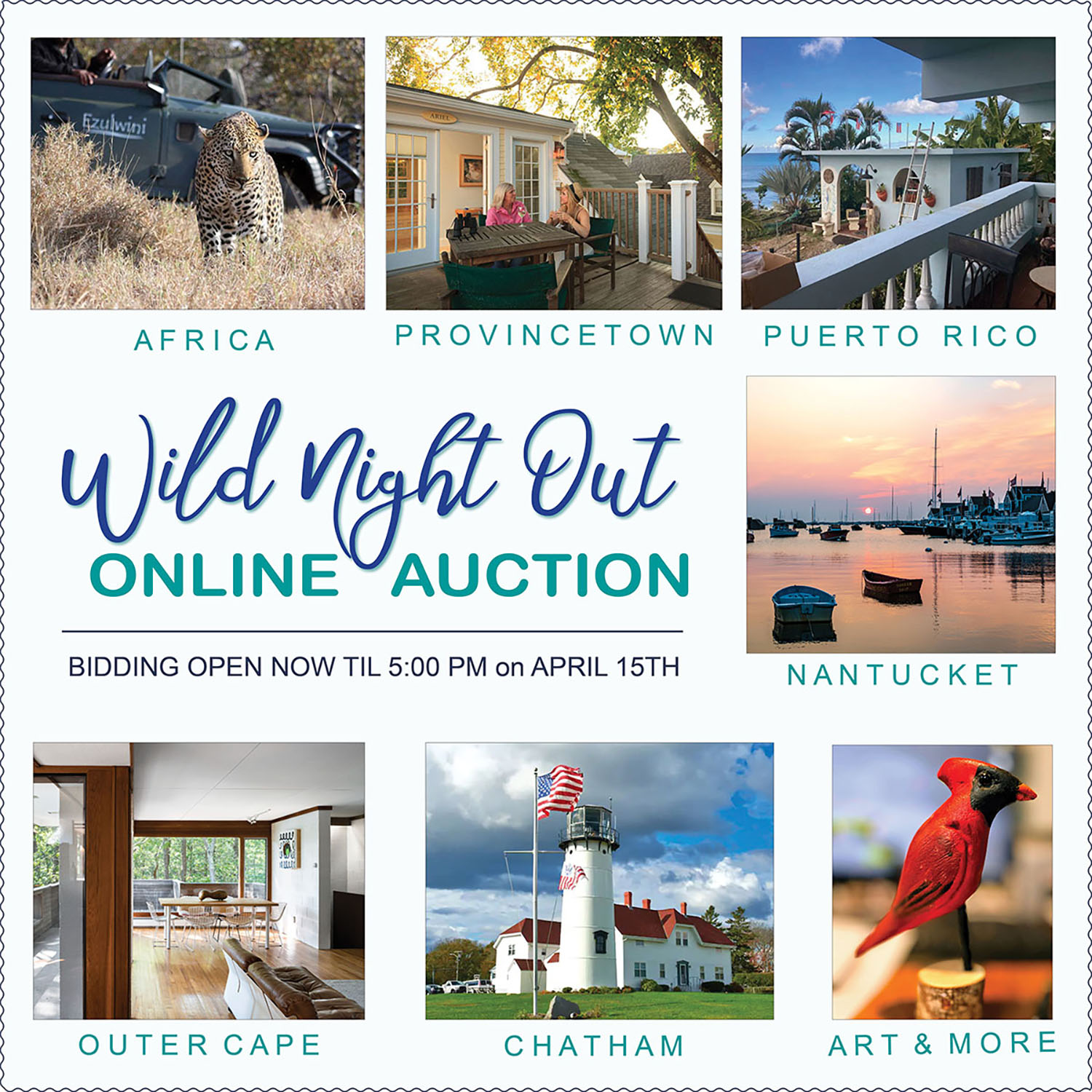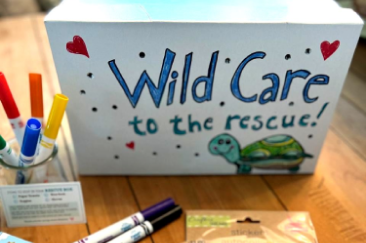
Save Birds From Window Strikes
Hundreds of millions of birds are killed each year by colliding with windows. Some estimates place the actual number at one billion. You might assume the leading culprit is tall buildings, but in fact our homes account for the greatest number of window collision fatalities.
Wild Care supporter, Peternelle van Arsdale, wrote an article based on her own experience with a bird window strike titled “Saving Birds One Window at a Time.” She shares some useful advice that can help save the lives of countless birds. Don’t wait for the “thunk,” do something to prevent bird window strikes now.
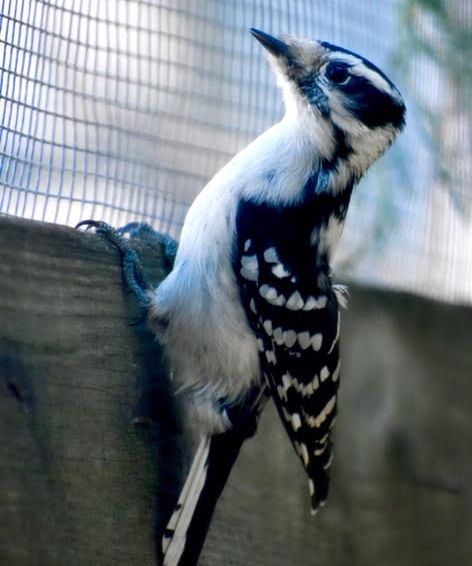
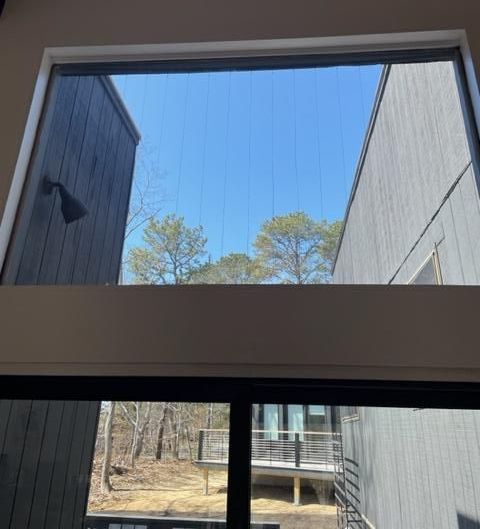
Read Saving Birds, One Window at a Time
Why Do Birds Strike Windows?
- Birds strike windows when they see trees and adjacent landscapes reflected in the glass. Birds do not easily interpret windows as impenetrable until the reflection is removed or reduced.
- Young birds suffer window strikes when learning new unfamiliar landscapes.
- Migratory birds become disoriented by outdoor lighting, causing them to circle buildings, structures and windows, often striking them.
- Inclement weather that forces migratory birds to temporarily halt their journey and land in new locations, poses a major window strike risk.
Simple Actions You Can Take To Protect Birds
- Acopian Bird Savers – Paracords hung outside in the fronts of windows
- CollidEscape – Collision reduction window films
- Feather Friendly Tape – Placed on the outside of windows within 2×4 or 2×2 inches apart and covering the window.
- Reduce window reflection by placing UV decals or opaque decals in your windows. Must cover the window and be placed within 4 inches apart or the decals will NOT be effective. Decals sold by WindowAlert and at the Bird Watcher’s General Store in Orleans.
- ArtScape Window Bird Deflectors – Beautiful window films and decorative accents that prevent bird strikes.
- Eliminate outdoor lighting which can disorient migratory birds.
- Turn off unnecessary indoor/outdoor lighting between the hours of 11:00 PM and 6:00 AM nightly.
- Draw vertical lines on your windows with a glass-writing pen. Must be less than 4 inches apart. Stripes/irregular patterns should be 1/8th wide and visible.
- Spray soapy water, or place UV liquid on your windows to break the reflection. (UV Liquid sold at WindowAlert.)
- You can also use other “bird friendly” tape, ribbons, or tempera paint on the outside of your windows (<4 inches apart and a minimum of 1/8th wide), or keep your shades down to reduce reflection.
- Place bird feeding stations within 15 feet of your home or dwelling to reduce strike impact.
Read The American Bird Conservancy’s Resource Sheet on how to prevent bird-window collisions
We’ve all heard that awful sound – a bird hitting your home or car window… If you are in your car and it is safe to do so, be sure the bird is safe from traffic or predators. Birds that hit windows often have injuries that cannot easily be seen (such as eye ulcers) even if they just look stunned. Your best course of action is to safely contain the bird and immediately contact Wild Care or your local wildlife rehabilitation facility for advice. Try to handle the bird as little as possible. Place bird into a shoebox with a towel and place in a warm, quiet, dark place indoors away from pets (no direct contact). Do NOT give food or water.
Call our Wildlife Helpline: 508-240-2255
Studies have shown that birds often suffer from injuries related to window strikes and symptoms may be delayed, or not seen by the naked eye. For this reason, we recommend that all window strike birds are brought to a licensed Wildlife Rehabilitator for assessment, instead of releasing the bird as soon as it becomes alert.
Find a Wildlife Rehabilitator in MA
One of the Lucky Ones
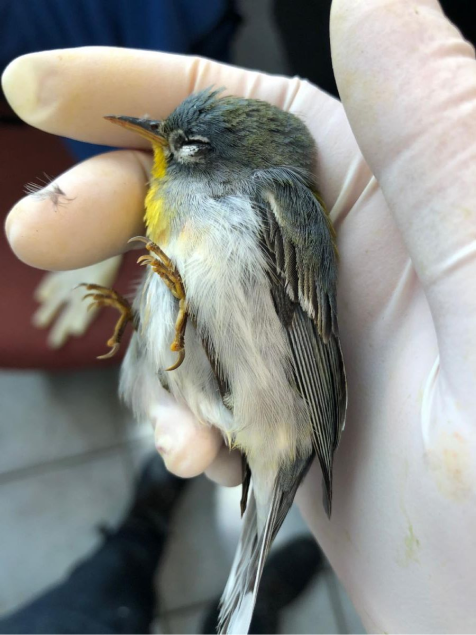
The photo above is a Northern Parula, This beautiful bird is a long-distance migrant warbler that winters in Mexico and is designated as a “Threatened” species in the state of MA. This bird arrived at Wild Care in May, 2022 during a migratory “fallout”. A fallout is usually related to severe weather patterns that force birds to land before reaching their final destination. Birds then fuel up, and are on their way when the weather clears. Unfortunately, light pollution during a fallout can quickly become disorienting to migratory birds. Birds may circle a lighted building to the point of exhaustion, and also strike buildings, structures and windows that might be in their path when they descend. This particular fallout was MASSIVE. The number of warblers seen on the Outer Cape within 24 hours was unprecedented and we received over a dozen window strikes in 24 hours. This little Parula was in terrible condition. Miraculously, with fluids, oxygen and rest, the bird recovered quickly and was released.
To see some great examples of window decals, and cords, visit:
Mass Audubon Long Pasture Wildlife Santuary Discovery Center in Cummaquid
Print and share the helpful Wild Care Guide to Help Prevent Bird Window Strikes
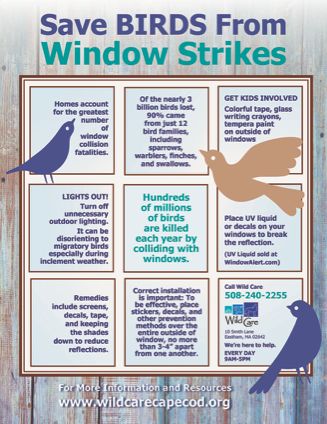
Click here for printable flyer
Be Prepared With Fun Projects for Kids or Classrooms
If you’d like a fun and educational project for kids or in the classroom, try making Wildlife Rescue Boxes and Kindness Socks. Fill and decorate socks with rice and decorate with inspirational messages to be used to sooth and warm rescued animals. Decorate Rescue Boxes with stickers and markers, make holes for air, then keep paper towels, gloves, goggles, and rice sock inside. Be sure to write our clinic phone number on the box so you have it handy. If you find an injured, ill or orphaned animal place the animal in the box in a quiet place until you can bring it to Wild Care for help.


Wild Night Out Online Auction
READY, SET, BID… We are so excited to announce that our Wild Night Out Online Auction is now live!
READ ALL NEWS
CALENDAR OF EVENTS
04 April, 2024
Wild Night Out Online Auction
EVENT DETAILS
05 April, 2024
Wild Night Out
EVENT DETAILS
28 February, 2024
Wildlife Winter/Spring Talk Series
EVENT DETAILS

DID YOU KNOW??
Wild Care has a state-of-the-art seabird therapy pool, which allows seabirds and waterfowl to exercise on running water. This will help our bird friends recover more quickly so they can get back to their watery habitats!

